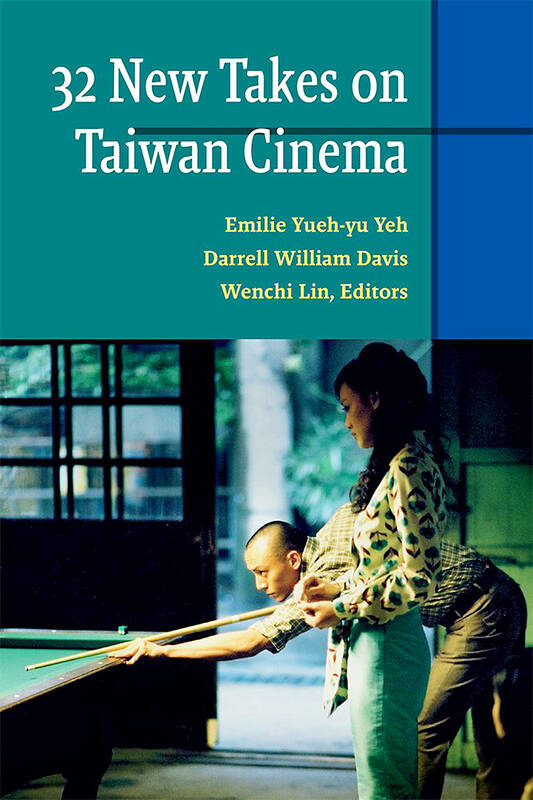The book 32 New Takes on Taiwan Cinema includes film reviews by 29 contributors. The collection of critical articles begins with an overview by the three editors then proceeds to present the articles in chronological order. The films, the editors tell us, have been selected for their ability to arouse curiosity, to surprise and to create an appetite for viewing.
The films cover a 60-year span, but deliberately omitted are already much-discussed items such as Edward Yang’s (楊德昌) 1985 classic Taipei Story (青梅竹), Wang Tong’s (王童) Strawman (稻草人) from 1987 and Hou Hsiao-hsien’s (侯孝賢) Daughter of the Nile (尼羅河女兒), 1983.
Thus, because this book leaves out films that are already very well-known, or at least very extensively discussed, it focuses on less well-known works that might conceivably one day be regarded as classics.

CINEMATIC GEMS
Early on in the book we encounter 1964’s The Best Secret Agent (天字第一號), a Taiwanese-language lady-spy film directed by mainlander Chang Ying (張英). It was a smash-hit at the box-office, with Chang’s wife, Pai Hung, playing the leading role. James Bond-like in nature, despite a refusal to accept advice from men, the female spy-hero is nonetheless motivated from the start by the death of her father. High-tech gadgets, worldwide travel and a high-class lifestyle that favors casual sex, all reflect the pervasive Bond influence despite the fact that the film is set in 1930s Shanghai.
The three artists responsible for 1965’s The Bride who Returned from Hell (地獄新娘) all received a Japanese-style education in Taipei. Influenced by Hitchcock and the Bond movies, plus traditional Chinese opera, the film was directed by Hsin Chi (辛奇) and is performed in Taiwanese, although the plot is based on an English-language novel by Victoria Holt.
Meanwhile another of Hsin Chi’s films, Dangerous Youth (危險的青春) from 1969, is described as “a treasure in Taiwan film history” although the topic is gritty — impoverished young people selling sexual favors in a forthright depiction of libido and sexual exploitation. The film was made in two weeks, not untypical for Taiwanese-language movies of the time.
CONTEMPORARY FILM
Moving forward, Chang Tso-chi (張作驥) is represented by his 2017 film True Emotion Behind the Wall: Taste of Salty Chicken (鹹水雞的滋味). The reviewer judges Chang as an especially sophisticated and sensitive director, and considers this movie his favorite of Chang’s output. It’s a short film — only 38 minutes long, and deals with prison life, something Chang himself experienced between 2016 and 2017 when imprisoned on a charge of sexual assault and sentenced to three years, although he was released early. Salty Chicken, then, was made during this sentence, and was probably responsible for his early release. Chang’s films are often long and enigmatic affairs, so this one offers something different.
LGBT themes are not rare in Taiwanese-language films, but Small Talk (日常對話), a documentary directed by Huang Hui-chen (侯孝賢), and released in 2017, stands out. It won the top prize for a documentary in the Berlin International Film Festival and focuses on lesbian relationships in one family over several generations.
In 2008’s Drifting Flowers (漂浪青春) Zero Chou (周美玲) presents a liaison in a cave during a thunderstorm that is reminiscent of the one between Dido and Aeneas in Virgil’s Aeneid, except, in this case, there are transgender elements. Critics, however, have preferred to point to the interface of transgender and transnational elements.
Wei Te-sheng (魏德聖) arrived on the scene in 2008 with his debut feature, Cape No. 7 (海角七號). It’s a romantic comedy featuring a failing rock musician, Aga, who goes to the southernmost tip of Taiwan to become a postal worker. There he meets a Japanese event coordinator, Tomoko. Critics mostly welcomed the return of romantic comedy, though a few resented what they saw as nostalgia for Japanese colonial rule in Taiwan. A different Tomoko also features as the intended recipient of a bunch of 50-year-old letters addressed to her at Cape No. 7.
Animation also has a place in this book, with young film-makers at the forefront. Sung Hsin-yin’s (宋欣穎) animated feature On Happiness Road (宋欣穎) compares Taiwan’s path to democracy with South Korea’s. The film won awards at film festivals in Busan, Tokyo, Stuttgart, Seoul and Ottawa, as well as in the Golden Horse Film Festival in Taiwan.
32 New Takes on Taiwan Cinema, then, is a book that will prove indispensable to anyone involved in the academic discussion of Taiwanese cinema. As said, the most celebrated films have been omitted, but this is an advantage seeing that it allows ample space for less famous works, many of them highly esteemed in their day.

March 10 to March 16 Although it failed to become popular, March of the Black Cats (烏貓進行曲) was the first Taiwanese record to have “pop song” printed on the label. Released in March 1929 under Eagle Records, a subsidiary of the Japanese-owned Columbia Records, the Hoklo (commonly known as Taiwanese) lyrics followed the traditional seven characters per verse of Taiwanese opera, but the instrumentation was Western, performed by Eagle’s in-house orchestra. The singer was entertainer Chiu-chan (秋蟾). In fact, a cover of a Xiamen folk song by Chiu-chan released around the same time, Plum Widow Missing Her Husband (雪梅思君), enjoyed more

Last week Elbridge Colby, US President Donald Trump’s nominee for under secretary of defense for policy, a key advisory position, said in his Senate confirmation hearing that Taiwan defense spending should be 10 percent of GDP “at least something in that ballpark, really focused on their defense.” He added: “So we need to properly incentivize them.” Much commentary focused on the 10 percent figure, and rightly so. Colby is not wrong in one respect — Taiwan does need to spend more. But the steady escalation in the proportion of GDP from 3 percent to 5 percent to 10 percent that advocates

From insomniacs to party-goers, doting couples, tired paramedics and Johannesburg’s golden youth, The Pantry, a petrol station doubling as a gourmet deli, has become unmissable on the nightlife scene of South Africa’s biggest city. Open 24 hours a day, the establishment which opened three years ago is a haven for revelers looking for a midnight snack to sober up after the bars and nightclubs close at 2am or 5am. “Believe me, we see it all here,” sighs a cashier. Before the curtains open on Johannesburg’s infamous party scene, the evening gets off to a gentle start. On a Friday at around 6pm,

A series of dramatic news items dropped last month that shed light on Chinese Communist Party (CCP) attitudes towards three candidates for last year’s presidential election: Taiwan People’s Party (TPP) founder Ko Wen-je (柯文哲), Terry Gou (郭台銘), founder of Hon Hai Precision Industry Co (鴻海精密), also known as Foxconn Technology Group (富士康科技集團), and New Taipei City Mayor Hou You-yi (侯友宜) of the Chinese Nationalist Party (KMT). It also revealed deep blue support for Ko and Gou from inside the KMT, how they interacted with the CCP and alleged election interference involving NT$100 million (US$3.05 million) or more raised by the